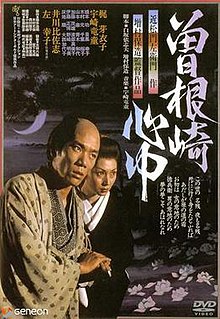The Love Suicides at Sonezaki (曽根崎心中, Sonezaki Shinjū, also released as Double Suicide Of Sonezaki[1]) is a 1978 Japanese historical romance film directed by Yasuzo Masumura starring Ryudo Uzaki and Meiko Kaji based on the Chikamatsu play of the same name.[2]
| The Love Suicides at Sonezaki | |
|---|---|
 DVD Cover for The Love Suicides at Sonezaki | |
| Directed by | Yasuzô Masumura |
| Written by | Yasuzô Masumura Yoshio Shirasaka |
| Produced by | Hiroaki Fujii Motoyasu Kimura Ryuhei Nishimura |
| Starring | Ryudo Uzaki Meiko Kaji |
| Cinematography | Setsuo Kobayashi |
| Edited by | Tatsuji Nakashizu |
| Music by | Ryudo Uzaki |
Release date |
|
Running time | 112 minutes |
| Country | Japan |
| Language | Japanese |
Plot edit
The plot follows closely the original play. Tokubei (Ryudo Uzaki) works as a soy-sauce maker. He falls in love with indentured prostitute O-Hatsu (Meiko Kaji). After O-Hatsu's indenture is bought by a wealthy patron, they plan to commit suicide.[3]
Cast edit
- Ryudo Uzaki - Tokubei
- Meiko Kaji - O-Hatsu
- Hisashi Igawa - Kyuemon
- Sachiko Hidari - O-Sai
- Isao Hashimoto - Kuheiji
- Gen Kimura - Kichibei
Production edit
Masumura's treatment of the play is quite literal,[4] and was considered by some (McDonald, 1994) the most faithful screen adaptation of any of Chikamatsu's plays second only to Kurisaki's puppet version two years later.[5] Masumura's casting of Uzaki, a rock star, and Kaji, a young idol, signaled an energetic approach to the story,[6] though the film was restrained by Masumura's standards and did not contain the elements of abnormal behaviour or attack on Japanese society for which Masumura was known. Instead Masumura adopted a theatrical but "sardonic" (Sultanik, 1986) approach with emphasis through concise editing and close-ups.[7]
The crew worked hard to a tight budget, and the lead actress Kaji had been so keen to work with Masumura that she took the role with no guarantee of any payment. The cast and crew finished the filming in 19 days. Kaji recalls that the last 3 days were done with actors and crew working through the nights.[8]
Critical reception edit
Lead actress Meiko Kaji won several acting awards for her performance, including the Blue Ribbon Award and Hochi Film Award for best actress.[9] The film showed in New York under the English title "The Love Suicides at Sonezaki,"[10] and at the Montreal Festival as "Double Suicide Of Sonezaki."
References edit
- ^ Variety's Film Reviews: 1978-1980 Bowker 1983 "Montreal Festival Double Suicide Of Sonezaki (COLOR-JAPANESE) Powerhouse Japanese (1703) period drama climaxing with lovers in joint bloody ritual taking of own lives. Strong word-of-mouth. Montreal, Aug. 31."
- ^ Clarke Fountain (2008). "Double Suicide of Sonezaki (1978)". Movies & TV Dept. The New York Times. Archived from the original on 26 May 2008. Retrieved 23 December 2012.
- ^ "曽根崎心中". Kinema Junpo. Retrieved 2 November 2020.
- ^ Joseph L. Anderson, Donald Richie The Japanese Film: Art and Industry 1982 Page 465 "After a long hiatus, during which Masumura worked for television, in 1978 he made a surprising and quite interesting film, The Love Death at Sonezaki (Sonezaki Shinju), a very literal adaptation of a Chikamatsu bunraku play. In it he returned ..."
- ^ Keiko I. McDonald Japanese Classical Theater in Films 1994 Page 86 "Sonezaki Shinju (The Love Suicides at Sonezaki, 1975), directed by Yasuzo Masumura. Kawakita Memorial Institute. Next to Kurizaki, Yasuzo Masumura made the most devoted transfer of a Chikamatsu play to the screen."
- ^ Donald Richie 日本映画ガイド 2005 Page 162 "It is interesting to compare Masumura's vital, noisy Love Suicides at Sonezaki (Sonezaki shinju, 1978), based on a Chikamatsu bunraku play, with Mizoguchi's slow and elegiac A Story from ICbikamatsu. Though it is a period-piece, the actors in the Masumura version were a rock star and a young "idol" starlet. After a breakneck if doomed romance, they go off onto a convoluted michiyuki which finds them as dead as the puppets they portray...."
- ^ Aaron Sultanik Film: A Modern Art 1986 - Page 447 "The film, however, misses the element of abnormal behavior that so forcefully pervades Hoodlum Soldier and The Red Angel. Love Suicide at Sonezaki is a departure from Masumura's frontal attacks on Japanese society. In his adaptation of a classic Chikamatsu puppet play, his approach is theatrical, sardonic. ... extravagant cross-references between film and theater in the manner of Ichikawa's An Actor's Revenge, but by his concise editing and close-ups, complementing the performer's artful excesses with the play's contemporaneousness."
- ^ Chris Desjardins Outlaw Masters of Japanese Film 2005 Page 71 "CD: You made three pictures with director Yasuzo Masumura. Could you talk about working with him, especially on Love Suicides At Sonezaki? KAJI: It was my dream to work with Mr Masumura from the time I was working at Nikkatsu. ...It was extremely hard with the fund-raising on that picture, there was no guaranteed salary, and I ended up doing it for basically nothing. We shot it in 19 days, and the last 72 hours of that the whole cast and crew went without sleeping to get it ."
- ^ "曽根崎心中(1978) - KINENOTE" (in Japanese). Kinema Junpo. Retrieved 23 December 2012.
- ^ New York Magazine Vol. 15, n° 26–28 June 1982 - Page 64 "June 23, 6 p.m.: "The Man Who Stole the Sun" (1979) by Kauhiko Hasegawa; 9 p.m.: "The Love Suicides at Sonezaki" (1977) by Yasuzo Masumura. June 24, 8 p.m.: "The Family" (1974) by Satsuo Yamamoto.
External links edit
- Double Suicide of Sonezaki at IMDb
- Sonezaki Shinjū at the Japanese Movie Database (in Japanese)